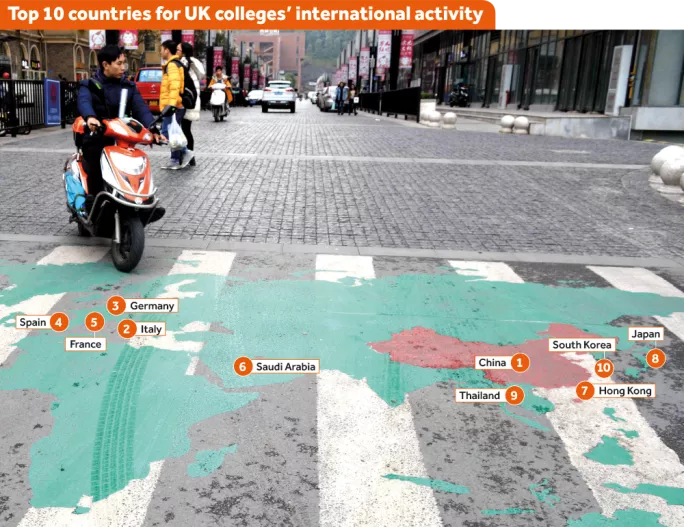The UK is still ‘an attractive place to study’ - but for how long?

The status of international students has rarely been so prominent in UK politics.
While at the helm of the Home Office, Theresa May insisted that they should be classed as long-term migrants, and, as such, included in the government target to slash the number of immigrants from hundreds of thousands per year to tens of thousands.
Since moving to 10 Downing Street, the prime minister has stubbornly stuck to her guns - with FE colleges bearing the brunt of public efforts to crack down on so-called bogus colleges and return migration to “sustainable levels”.
In 2016, the number of people from outside of the European Union applying for a student visa for study at a college dropped by more than 8 per cent - with the decline becoming sharper in the wake of the Brexit vote.
Pressure, however, is building on the prime minister to remove international students from the net immigration figures. Last week, it emerged that Cabinet ministers and former select committee chairs were among the Conservative rebels threatening to back an amendment to the immigration bill to push through the change.
The shift in tone also follows another significant move for FE: October’s launch of the cross-sector UK Skills Partnership in partnership with the Department for International Trade, with the aim of building a coherent package of technical and vocational education and training for the export market. “We will do everything in our power to help you export, expand, succeed,” international trade secretary Liam Fox told the launch event.

Now, major new research from the Association of Colleges reveals for the first time the scope and size of the international work done by colleges - and how lucrative it can be. Among the 90 colleges that responded to the survey - including the majority of institutions known to be active overseas - the international market was worth £57 million.
Over two-thirds of the colleges surveyed were actively engaged in international activity, worth £800,000 per institution on average. But 28 per cent of those surveyed had dropped out of international provision in the past five years. Colleges engage with learners from China the most, followed by Italy, Germany, Spain and France (see graphic, above).
Emma Meredith, the AoC’s international director, says that while for some colleges international work is “a commercial venture - for example, through international student recruitment or the provision of technical training to overseas partners”, for others, it is “about engaging students and staff in exchange projects”. The most popular type of operation was the recruitment of international learners to study in the UK.
Other activities included Erasmus+ - the EU-funded programme that offers students the opportunity to study or work in other European countries - as well as delivering training for overseas governments, consultancy work, online training and operating campuses overseas.
Brexit threatens matkets
The institution with the biggest overseas presence was Lincoln College Group, with a total of 4,500 students: 3,500 based across two colleges in Saudi Arabia, and 1,000 across two colleges in China.
A college spokesperson says that these projects provide “additional income streams for investment in its UK-based colleges in Lincolnshire and Nottinghamshire”, as well as a platform for “cross-fertilisation of education and training capacity and capability”. The spokesperson adds: “Increasingly, technology is facilitating active shared learning. One example of this is a current trial linking Microsoft Showcase classrooms between Lincoln and Riyadh, so engineering lecturers and students can interact and learn together.”
On average, internationally active colleges enrol 121 non-EU students a year in the UK, many on short-term study visas, with English language the most popular subject.
“Over the last five to eight years, many colleges have had to adjust their international strategies away from a primary focus on international student recruitment,” says Meredith. “They’ve had to adapt quickly to changing UK government policy on student visas and how college inspection grades in England are linked to student visa sponsorship licences.”
Of the countries that UK colleges engage with, China was far and away the most popular. “The Chinese still believe the UK is an attractive place to study,” says Shelagh Legrave, principal of Chichester College. As well as teaching Chinese students in West Sussex, the college is also starting a new partnership that will that will, for example, allow Chinese students to access online culinary skills workshops, filmed and recorded at Chichester College and streamed to students in Tianjin.
After a significant drop in international student numbers last year, the college is now in a “slightly stronger position”, Legrave adds. “We have got a few more students wanting to come here to study English than we had last year - between 150 and 200 in a week. We also grew the number of students who want to come to study A levels, or do a year abroad with us. There still seems to be demand.”
Behind China, it is EU countries that have attracted the most colleges - a market that could be under threat as the UK approaches Brexit.
“The first hurdle to overcome is any perception that the Brexit vote means the country is closed for business, and that we don’t want people from other countries to come here,” says Meredith. “The EU is so important to college international work, first through participation in the Erasmus+ mobility programme and secondly because of EU nationals who choose to study here.”
It is not yet clear whether the UK will be involved in Erasmus+ beyond 2020.
Brexit is a “significant issue ” at Boston College, where 23 per cent of students are EU nationals from outside of the UK - many of them on English for speakers of other languages (Esol) courses, says principal Jo Maher. In the EU referendum, the Lincolnshire town had the highest Leave vote in the UK: 76 per cent. A 2016 report by the Policy Exchange thinktank said that it was the least integrated town in England.
Maher says: “Boston has its challenges, so we are supporting the council in its aim to have an integrated community. We take a long-term approach to this. Once your language is taken care of, we can support that person in improving technical skills.”
You need a Tes subscription to read this article
Subscribe now to read this article and get other subscriber-only content:
- Unlimited access to all Tes magazine content
- Exclusive subscriber-only stories
- Award-winning email newsletters
Already a subscriber? Log in
You need a subscription to read this article
Subscribe now to read this article and get other subscriber-only content, including:
- Unlimited access to all Tes magazine content
- Exclusive subscriber-only stories
- Award-winning email newsletters